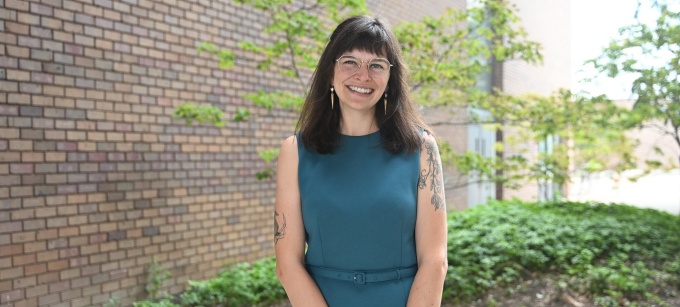
Exploring law’s reach in the world of music
In the music theory classes she taught at the famed Eastman School of Music, in Rochester, Lauren Wilson would sometimes call on students—and there in class they’d have to sing.
She won’t do that at UB School of Law. “I intend to tell my law students they could have it a lot worse,” she jokes.
Wilson, who joins the UB Law faculty this year to teach in both the undergraduate and JD programs, is anticipating lively discussions in her property and intellectual property courses. “I’m looking forward to having students who have done so many different things in their lives before becoming law students,” she says. “They all have very different goals, and they also bring very different experiences to the classroom.”
A classical guitarist by training, Wilson earned her undergraduate degree in music performance, then a master’s degree in music theory before entering a doctoral program at the Eastman School. There she taught classes including music theory and aural skills, as well as one in study skills for first-year students. Along the way she also discovered law, and the fascinating ways in which intellectual property law intersects with the lived experience of composers and performers.
That intersection became clear during a summer job at a law firm. “I was handed a music copyright case,” she says, “and I was able to see how the skills that I had been developing in what can sometimes feel like an obscure area of music theory could be useful to a concrete legal issue. I helped the attorneys at the firm do something they couldn’t necessarily do, or at least helped them do it more efficiently.”
That led her to the University of Michigan Law School, where she served on the Michigan Journal of Law Reform and earned her JD in 2023. It was a busy time: While in law school, she was also completing her PhD dissertation, which applies the insights of music theory to the development and further evolution of copyright law. “I had to work really efficiently,” she says. “I imagined the dissertation as a collection of articles bridging music theory and music copyright. So a journal note I wrote became one of my chapters, and so did a reworked version of a seminar paper. Pretty early on in law school I knew I wanted to be an academic, so I was constantly looking for ways to merge my studies of law and music.”
Wilson then spent two years in Washington, D.C., as law clerk in the U.S. Court of Federal Claims, writing draft judicial opinions and doing research. The trial-level court adjudicates compensation for takings claims and disputes involving government contracts.
Now she’s back in Western New York and back at the head of the class, teaching a JD course in property and an IP offering for undergraduates that will both survey IP law as a whole and engage in close study of copyright law.
Wilson says she was drawn to UB Law by its reputation for cross-discipline study, an approach that piqued her academic interest at Michigan as well. “The interdisciplinary work of the UB faculty struck me pretty immediately, because that’s where my work lies too,” she says. “My work in IP is concerned with who gets to own works, how the rules of ownership in IP relate to general theories of property, and how these legal questions do and do not align with how artistic communities view their work. I’m also very interested in land ownership and environmental issues, so I’m glad that I will be able to work with those as I teach Property in the Spring.”
As an example, her research into the development and application of copyright law explores the tension between how different actors view the law. She has looked at how musicians understand music vs. how the law understands it, and how musicians understand the law as compared to how judges and lawyers understand the law. “Those don’t always match up,” she says. “A lot of times a copyright decision comes down and musicians are angry because they don’t think it reflects what they do. These decisions can be counterintuitive to how artists understand who is the author of their work.”
For instance, she notes that much copyright law addressing music grew out of lawmakers thinking “mostly about classical music in sheet music form and in traditional Western notation.” But laws developed to protect that music doesn’t fit well in protecting the creators of modern music, such as hip-hop with its tradition of sampling and improvisation. “There’s some value judgment baked into the law,” she says, “and there is a fit problem between what lawmakers were originally trying to protect and the music that’s coming into the courts now.
“We don’t have a music copyright law, just one copyright law that gets applied to all these different creative disciplines. The law fits some mediums better than others, and there are places where music falls through the cracks.”
It’s that rich complexity of analysis that Wilson will bring to her teaching. “A job like this has been pretty much my goal since I went to law school,” she adds. “I’m super excited to be here.”